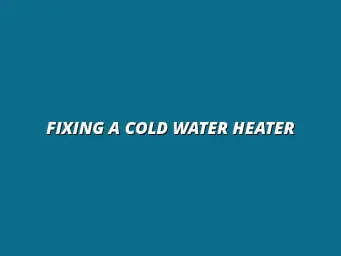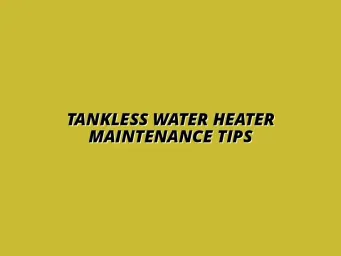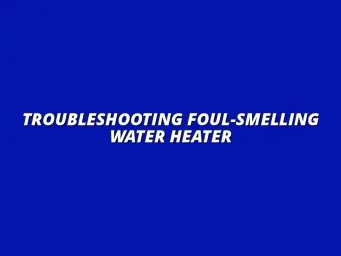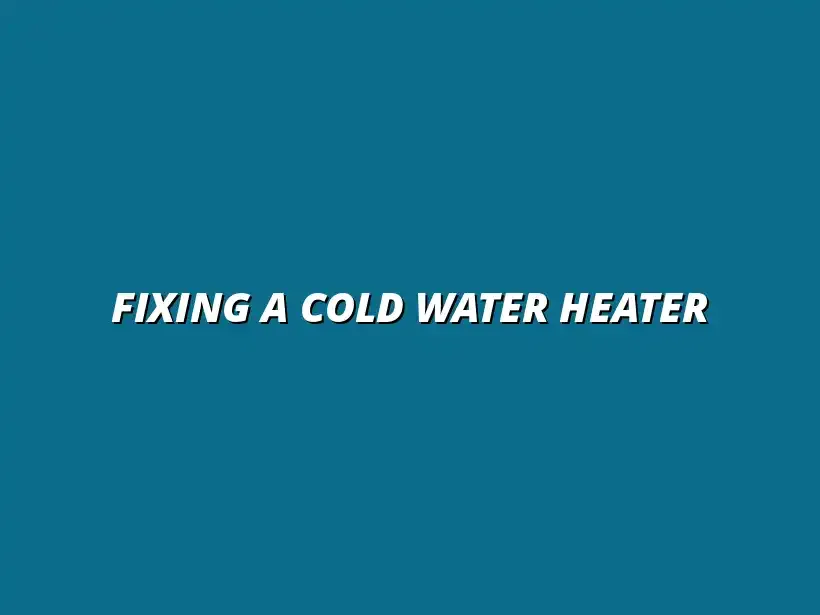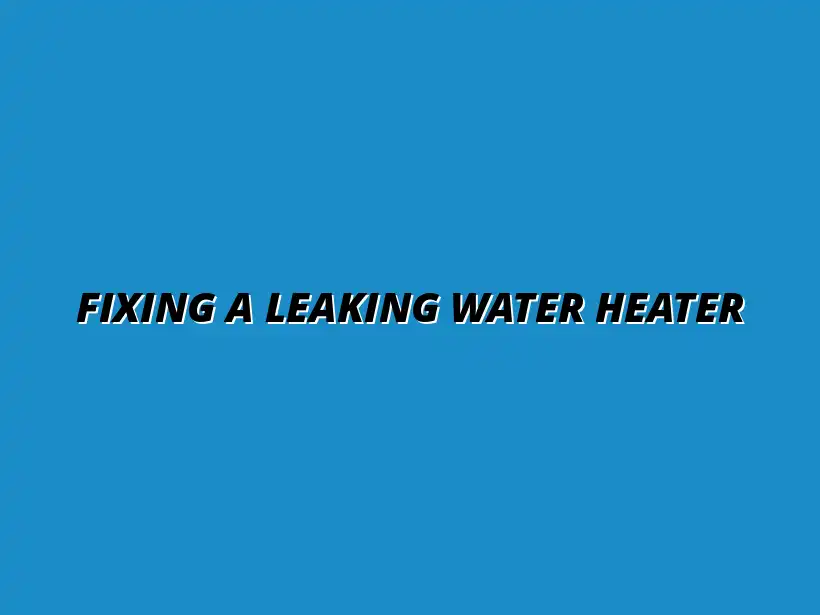
Fixing a Leaking Water Heater
Understanding Water Heater Leaks and Their Causes
Water heater leaks can be a homeowner's nightmare. They can cause water damage, mold, and higher energy bills. It's crucial to understand the different types of leaks and their causes to address them effectively.
Addressing a leak promptly not only saves money on repairs but also prevents further damage to your home. Knowing why your water heater is leaking is the first step toward a solution! Let's dive into some important details about water heater leaks.
The Importance of Addressing Water Heater Leaks Promptly
When you notice a leak, it’s essential to act quickly. A small leak can quickly escalate into a much larger problem, potentially leading to extensive water damage. Ignoring it could result in costly repairs and hazardous conditions in your home!
Additionally, addressing these issues promptly can help you save on your water bill. Water that is leaking can add up, leading to higher charges on your monthly statement. So, the sooner you fix the leak, the better it is for your wallet and your home’s integrity. For more information on addressing burst pipes, check out this helpful guide on repairing a burst pipe quickly.
- Prevents water damage to floors and walls.
- Reduces the risk of mold growth.
- Helps maintain energy efficiency.
Common Reasons for Water Heater Leaking from the Bottom
Understanding the common causes of leaks can help you determine what’s going on with your water heater. Here are some frequent culprits:
- Corrosion and rust buildup.
- Loose drain valve or connections.
- Faulty temperature and pressure relief valve.
- Cracked tank or structural damage.
Corrosion and Rust Buildup
Over time, the metal components of your water heater can corrode, leading to leaks. This is especially true if your water heater is older or if your water supply has high mineral content. Regular maintenance can help catch these issues before they become serious. For example, regular anode rod replacement is crucial.
Corrosion often starts small but can grow if not managed. If you see rust around the tank, it's a sign that your heater may need attention. Taking action can prolong the life of your unit!
Loose Drain Valve or Connections
Another common reason for leaks is a loose drain valve. If the connections to this valve aren’t secure, water can escape. This can often be fixed simply by tightening the valve or the connections. Don't overlook this step!
Check around the base of the heater for puddles, as this is often where water will accumulate. A thorough inspection can save you a lot of hassle down the road. If it seems too tight or damaged, it might be time for a replacement. You can find comprehensive repair guides, including information on fixing a leaking water heater pipe, here.
Faulty Temperature and Pressure Relief Valve
The temperature and pressure relief valve (TPR valve) is essential for your water heater's safety. If it’s not functioning correctly, it can lead to leaks. This valve helps to release excess pressure, and if it’s faulty, it can cause water to escape.
Inspecting the TPR valve regularly can prevent potential disasters. If you notice water dripping from the valve, it’s best to address the issue immediately to avoid more significant problems!
Cracked Tank or Structural Damage
If your water heater is old or has experienced temperature extremes, the tank itself may be cracked. This is one of the more serious issues, as it usually means the heater will need replacement. A cracked tank can lead to substantial water loss!
Always keep an eye on your water heater’s age and condition. If you suspect structural damage, it’s important to evaluate whether repair or replacement is the best option. Regular checks can help catch these issues early. Learn more about water heater leak causes and fixes.
Effective Methods for Repairing Water Heater Leaks
When it comes to repairing water heater leaks, finding the right approach is crucial. Depending on the severity of the leak, the methods can range from simple fixes to comprehensive repairs. Understanding these methods can save you time and money, ensuring your water heater functions well for years to come!
Before diving into repairs, it’s essential to assess the type of leak you’re dealing with. Is it minor or major? This distinction helps determine whether you can tackle the problem yourself or if you need to call in a professional. Let's explore some effective methods for both temporary and permanent solutions. For regular maintenance advice, including checks for your bathroom water heater, you can consult this resource.
Temporary Fixes for Minor Leaks
Minor leaks can often be addressed quickly to prevent further damage. These temporary fixes can help you manage the situation until a more permanent solution is applied. Here are some methods you can try:
- Using Epoxy Sealants: These sealants can create a waterproof barrier around the leak. Just clean the area thoroughly before applying, and allow it to cure as directed.
- Applying Pipe Tape to Leaky Connections: Wrap plumber's tape around leaky joints to create a tight seal. This is an easy and quick solution that can buy you some time!
These temporary fixes can be lifesavers, especially in emergencies. However, always plan for a more permanent repair as soon as possible to avoid larger issues.
Permanent Solutions for Major Leaks
For major leaks, it’s important to implement more permanent solutions. These often require a bit more effort but are necessary for the longevity of your water heater. Below are effective methods to consider:
- Replacing the Drain Valve: A Step-by-Step Guide: If the drain valve is the source, you can replace it by draining the tank, removing the old valve, and installing a new one. Make sure to use Teflon tape on the threads for a tight seal!
- Repairing or Replacing the Temperature and Pressure Relief Valve: If this valve is faulty, it can cause significant water loss. You can often replace it by unscrewing it and installing a new one.
- Assessing and Repairing Tank Issues: If you discover cracks or corrosion, you might need to patch the tank or consider replacing the entire unit. This is usually a more complex repair.
Choosing the right permanent solution not only stops the leak but also boosts the efficiency of your water heater. It's always wise to evaluate the condition of your unit before deciding on a repair. For easily flushing your water heater, a key part of maintenance, see this guide.
Preventing Future Water Heater Leaks
Once you’ve tackled the leak, it’s essential to focus on prevention. Regular maintenance can go a long way in keeping your water heater in top shape. By taking proactive steps, you can help avoid future leaks and other issues.
Incorporating routine practices can save you from the hassle of unexpected repairs! Here’s what you can do:
- Regular Inspections and Flushes: Check your water heater regularly for signs of leaks and flush the tank annually to remove sediment buildup.
- Monitoring Water Pressure and Temperature Settings: Ensure that your water pressure and temperature are set at optimal levels to prevent stress on the unit.
By following these simple maintenance practices, you can extend the life of your water heater and keep leaks at bay. Remember, prevention is always better than a cure!
Common Misconceptions About Water Heater Repairs
There are many misunderstandings regarding water heater repairs that can lead to confusion. It's essential to separate fact from fiction to make informed decisions about your repairs. Here are some common misconceptions:
- DIY vs. Professional Repairs: When to Call an Expert: Many believe they can handle all repairs themselves, but sometimes a professional is necessary to ensure safety and effectiveness. If you need a plumber in Billesley, Birmingham, for example, you can find local services here.
- The Myth of Costly Water Heater Repairs: While some repairs can be expensive, many minor fixes are quite affordable and can save you money in the long run.
Understanding these misconceptions can help you navigate your water heater repairs more effectively. It's all about making the right decisions for your situation!
Resources and FAQs for Water Heater Issues
Having access to reliable resources and information is crucial for any homeowner when it comes to water heater issues. Here, I'll highlight some common questions and useful resources you can tap into.
Frequently Asked Questions about Water Heater Leaks
Here are some common questions people ask about water heater leaks:
- What Should I Do if My Water Heater is Leaking? First, turn off the power and water supply to the unit. Then, assess the leak and determine if it’s a minor or major issue.
- Can I Continue Using a Leaking Water Heater? It’s advisable to stop using a leaking water heater immediately to prevent further damage and potential hazards.
Remember, seeking answers to your questions is a smart way to stay informed about your water heater's health!
Additional Resources for Homeowners
When it comes to water heater issues, there are many resources available to help you:
- Links to Maintenance Checklists and Repair Guides: These can offer valuable insights and step-by-step instructions for common repairs and maintenance tasks.
- Recommendations for Professional Services: If a repair seems too daunting, it's always a good idea to have a list of trusted professionals who can assist you.
Being equipped with the right resources can greatly enhance your ability to handle any water heater issues that arise!
Final Thoughts on Water Heater Leak Repairs
In conclusion, addressing water heater leaks effectively involves a combination of immediate repairs and preventive measures. Regular maintenance is key to ensuring your water heater operates efficiently and remains leak-free.
As you reassess the effectiveness of your repairs, always remain proactive. By encouraging routine checks, you can minimize the risk of future leaks and enjoy the comfort of hot water without worry!
